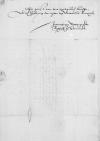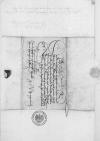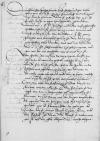Durchlauchter, hochgeborner furst, hochgunstiger, lieber herre und freundt. / Unsere freuntliche und vleiswillige dienste zovoran. /
Uns ist gestrigs tags E(wer) F(urstlichen) D(urchlauch)t ⌊⌋, / dorin ir eigen ⌊⌋, / gewordenn, / doraus wir E(wer) F(urstlichen) D(urchlauch)t gunstigs mitleiden unserschwacheit halben / abermals gerne vornommen, / woraus wir nicht anders spuren, / dan derselbten E(wer) F(urstlichen) D(urchlauch)t / gantz gewogen und freuntlich gemut gen uns, / dovor wir mit hochem vleis dancken. / Und weil wir befinden, das E(wer) F(urstliche) D(urchlauch)t solch mitleiden christlich meynet, / mugen wir der nit vorhalten, / wie es umb uns ist. /
Wir haben im anfang dis vorgangnen herbsts ein schweren catarrum gehabt, / welcher, do er seine flusse zur brust gelassen, / hat er die hinden in die achsseln und schuldern gewendt, / von dannen in die rechte seitte / als handt und bein gezogen, / welchs wir noch, wie superinscribed⌈wiewie superinscribed⌉ die flusse gehen, entpfintlich fuelenn. / Wir sein aber der hoffnung zu Gott, das sie im kurtzen werden ablassen etc.
Von zeitungen ist uns negst von dem ⌊schatzmeister uff Marienburg⌋ ⌊⌋, / die sich etwan mit den forigen vorgleichen, / als nemlich, das die ⌊Hungarn⌋ nicht fast treulich gehandelt, / wie bei ⌊Perenni Peter⌋, / der gefangen, / befunden. / Dorzu stimpt ⌊Seredi Caspar⌋ / zurin / und der ⌊bischoff zu Gran⌋, / der ⌊Beweck⌋ ist entkommen gen [...] paper damaged⌈[...][...] paper damaged⌉st / uff ein schlos ⌊Alexen Tursi⌋, / welchs belegert, /  GStA PK, HBA, C1 No 866, 2 unnumbered gewonnen sol sein, / und beide, / ⌊Beweck⌋ und ⌊Alex⌋, / gen ⌊Wien⌋ gefurt. / Es wirt gleubt, ( des wir uns nicht wenig vorwundern ) das gemelter ⌊Tursi⌋, der so vil gnad bei ⌊ro(mische)r ko(nigliche)r m(aieste)t⌋ gehabt, / alles, was in deutzscher nacion, / der zungen er auch ist, / und im rath bei ro(mische)r ko(nigliche)r m(aieste)t beschlossen, / dem ⌊Turcken⌋ hab mitgeteilt. / So ferlich stehets itzundt in der welt umb den glauben etc. Es ist auch negst von koniglichem hoffe ein turkischer bott abgefertigt, / der mit dem ersten antwort nicht zufriede gewest, / derhalben ⌊ko(niglich)e m(aieste)t⌋, unser allergnedigister herre, / mit im, / den ⌊Podlodowski⌋ / und ⌊Starsikowski⌋ in die ⌊Podolien⌋ geschickt, / zubesichtigen und zubeschreiben den schaden, / nicht allein der itzunder, / sondern auch vor etlichen jaren dem ⌊Turcken⌋ solt gescheen sein, / und ins ende hat man zum mehern must thun, was dem boten gefellig / etc. Woraus offentlich wirt vorstanden, / das der ⌊Turck⌋ ursach zu uns sucht. / Got der almechtige wolte seiner bedruckten christenheit, / der ⌊Cron⌋ und uns hie allen uf dis zukunfftige vorjar / mit barmhertzigkeit nicht abstehen. / Was wir weiter, / wie wir uns vorsehen, im kurtzen, / werden uberkommen paper damaged⌈[n]n paper damaged⌉, / wolle wir Euer F(urstlichen) D(urchlauch)t unangezeigt nicht lassen paper damaged⌈[en]en paper damaged⌉n, / der freunt
GStA PK, HBA, C1 No 866, 2 unnumbered gewonnen sol sein, / und beide, / ⌊Beweck⌋ und ⌊Alex⌋, / gen ⌊Wien⌋ gefurt. / Es wirt gleubt, ( des wir uns nicht wenig vorwundern ) das gemelter ⌊Tursi⌋, der so vil gnad bei ⌊ro(mische)r ko(nigliche)r m(aieste)t⌋ gehabt, / alles, was in deutzscher nacion, / der zungen er auch ist, / und im rath bei ro(mische)r ko(nigliche)r m(aieste)t beschlossen, / dem ⌊Turcken⌋ hab mitgeteilt. / So ferlich stehets itzundt in der welt umb den glauben etc. Es ist auch negst von koniglichem hoffe ein turkischer bott abgefertigt, / der mit dem ersten antwort nicht zufriede gewest, / derhalben ⌊ko(niglich)e m(aieste)t⌋, unser allergnedigister herre, / mit im, / den ⌊Podlodowski⌋ / und ⌊Starsikowski⌋ in die ⌊Podolien⌋ geschickt, / zubesichtigen und zubeschreiben den schaden, / nicht allein der itzunder, / sondern auch vor etlichen jaren dem ⌊Turcken⌋ solt gescheen sein, / und ins ende hat man zum mehern must thun, was dem boten gefellig / etc. Woraus offentlich wirt vorstanden, / das der ⌊Turck⌋ ursach zu uns sucht. / Got der almechtige wolte seiner bedruckten christenheit, / der ⌊Cron⌋ und uns hie allen uf dis zukunfftige vorjar / mit barmhertzigkeit nicht abstehen. / Was wir weiter, / wie wir uns vorsehen, im kurtzen, / werden uberkommen paper damaged⌈[n]n paper damaged⌉, / wolle wir Euer F(urstlichen) D(urchlauch)t unangezeigt nicht lassen paper damaged⌈[en]en paper damaged⌉n, / der freunt GStA PK, HBA, C1 No 866, 3 unnumberedlichen gunst wir uns vortreulich bevelhen. /
GStA PK, HBA, C1 No 866, 3 unnumberedlichen gunst wir uns vortreulich bevelhen. /
 GStA PK, HBA, C1 No 866, 4 unnumbered
GStA PK, HBA, C1 No 866, 4 unnumbered  GStA PK, HBA, C1 No 866, 1 unnumbered
GStA PK, HBA, C1 No 866, 1 unnumbered  GStA PK, HBA, C1 No 866, 2 unnumbered gewonnen sol sein, / und beide, /
GStA PK, HBA, C1 No 866, 2 unnumbered gewonnen sol sein, / und beide, /  GStA PK, HBA, C1 No 866, 3 unnumberedlichen gunst wir uns vortreulich bevelhen. /
GStA PK, HBA, C1 No 866, 3 unnumberedlichen gunst wir uns vortreulich bevelhen. /



